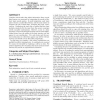Free Online Productivity Tools
i2Speak
i2Symbol
i2OCR
iTex2Img
iWeb2Print
iWeb2Shot
i2Type
iPdf2Split
iPdf2Merge
i2Bopomofo
i2Arabic
i2Style
i2Image
i2PDF
iLatex2Rtf
Sci2ools
112
Voted
CIKM
2010
Springer
2010
Springer
Computing the top-k maximal answers in a join of ranked lists
Complex search tasks that utilize information from several data sources, are answered by integrating the results of distinct basic search queries. In such integration, each basic query returns a ranked list of items, and the main task is to compute the join of these lists, returning the top-k combinations. Computing the top-k join of ranked lists has been studied extensively for the case where the answer comprises merely complete combinations. However, a join is a lossy operation, and over heterogeneous data sources some highlyranked items, from the results of the basic queries, may not appear in any combination. Yet, such items and the partial combinations in which they appear may still be relevant answers and should not be discarded categorically. In this paper we consider a join where combinations are padded by nulls for missing items. A combination is maximal if it cannot be extended by replacing a null by an item. We present algorithms for computing the top-k maximal combinations...
| Added | 10 Feb 2011 |
| Updated | 10 Feb 2011 |
| Type | Journal |
| Year | 2010 |
| Where | CIKM |
| Authors | Mirit Shalem, Yaron Kanza |
Comments (0)

